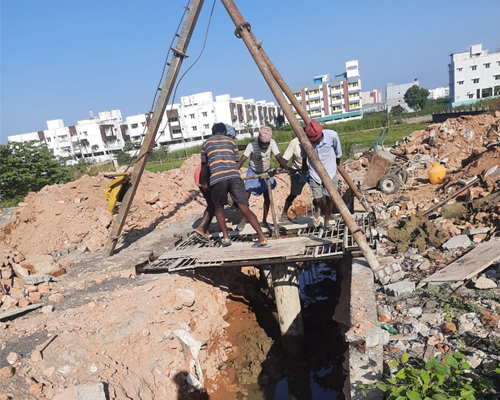Can Board Piles Be Used on New Construction
Yes! For areas with poor soil conditions, Board piles are used to carry the building load down to bedrock or deeper and more secure soil. Helical board piles can be used for new building sites with any of the following problematic soil conditions in Chennai.
- Expansive Soil
- Clay Soil
- Sand or Sandy Soil
- High Water Table
- Poorly Draining Soil
- Peat Soil
- Silt Soil
Many Chennai homes and smaller projects can have all their Board piles installed in a single day. Here are more reasons that make board piles an excellent solution in most circumstances:
- They require minimal excavation
- They are cost effective
- They are environmentally friendly
- They have versatile applications
In regards to their versatility, helical piles can be used for homes, commercial buildings, telecom towers, decks, basement walls, bridges, signs, retaining walls, and more.
Applications
Rotary bored piles are constructed by use of an auger that excavates the soil to a required size before a steel cage or pattern of reinforcing bars is introduced followed by the pouring of concrete.
A steel casing may be inserted to maintain the bore through unstable ground that is typically later withdrawn.
Bored piles are ideal for any application and are the dominant foundation type in urban areas, where there is economical access to concrete. Bored piles provide the largest load carrying capacity of any pile type and the piles axial capacity can be increased economically by belling the base of the pile.
Maintenance
The slurry level should be maintained two to three meters above the water table to overbalance hydrostatic soil pore pressure and maintain soil stability. If the slurry drops below the specified level, the operation should be paused and the proper slurry level re-established before proceeding.
In some situations, we may recommend that the slurry be maintained at less than two meters above the water table; to reduce the rates of fluid loss. It should be noted that PHPA polymers will shear degrade, resulting in reduced viscosity. Once hydrated mechanical shear should be limited to prevent this.
The point of reference for maintenance of the slurry level should be the water table. The casing does not change the requirement to keep the slurry level above the water table. Attempts to excavate or hold open excavation in saturated or unstable soils with inadequate slurry head pressure may result in soil collapse below the casing. The stabilising fluid is added to the shaft before encountering the groundwater table. Contact us for more details: 88074 08582 .








